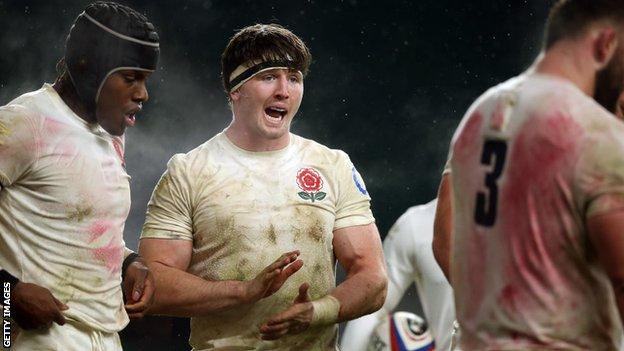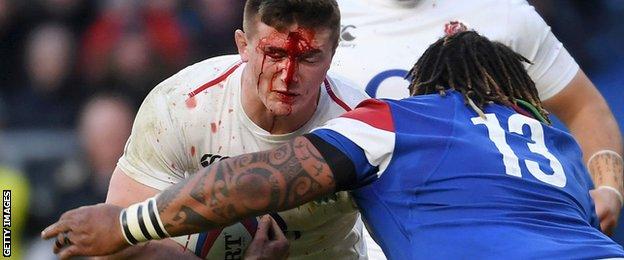
| Venue: Murrayfield, Edinburgh Date: Saturday 5 February Kick-off: 16:45 GMT |
| Coverage: Watch live on BBC One and BBC iPlayer; live commentary on BBC Radio 5 Live and BBC Sport website and app. |
Six years ago Eddie Jones made a call that marked England as his own.
He chose Dylan Hartley as his captain.
"He had the courage, positivity and resolve to step forward," Jones reflected last year.
"He would lead by example, because he was such a tough and abrasive player, but he would also use his intelligence and empathy."
It was a surprise pick to many. Hartley was unblemished by the fall-out from England's 2015 Rugby World Cup implosion. But only because a ban for a headbutt left him sidelined for the tournament.
It wasn't Hartley's first suspension. In total, he had spent 54 weeks - more than a year - in the sin bin for various bites, gouges and stray elbows.
Relentlessly confrontational, Hartley seemed more iron fist than kid glove. But Jones' hunch was right. Hartley led England to a Grand Slam and successive Six Nations titles before handing the baton to Owen Farrell, another figurehead with more scowl than smile.
As Jones returns to Murrayfield, where he and Hartley won their first game in charge in 2016, that dynasty takes an unexpected twist.
Tom Curry is a more relaxed figure.
He was England's youngest Test debutant since Jonny Wilkinson when he appeared against Argentina as an 18-year-old in 2017.
But where Wilkinson was weighed down by his own and others' expectations, Curry seems freer, younger at heart. He enjoys himself, his rugby and things outside the sport.
At one media conference he revealed investing tips from a mates' WhatsApp group. Silver was the commodity of choice apparently.
In a live web chat he jokingly invited any admirers to "hit me up" on Instagram.
It is hard to imagine Wilkinson, Farrell, Hartley or injured captaincy contender Courtney Lawes taking such detours.
But the ready grin and high spirits are a deceptive disguise.
There is an image of Curry from the 2019 Six Nations that better sums up his intense on-pitch alter ego.
It captures Curry in full flight. With the ball tucked under one arm and blood coursing from a wound on his forehead, the back row steams into a collision with France's wrecking ball centre Mathieu Bastareaud.

It's an unsurprising frame. No-one puts his head into more painful places than Curry. In last year's Six Nations, there was no greater pest around the breakdown. The stats showed him slowing down the opposition and forcing turnovers better than any other player.
On the other side of the ball, he has got bigger and better. He put on bulk during lockdown - eating four meals a day while lifting weights - and has taken on more ball-carrying burden as a number eight.
His athleticism and endurance means he hangs around to hold sway. Curry, who was part of Manchester City's academy and Cheshire's age-grade cricket as a teenager, played every minute of last year's Six Nations and autumn internationals. He's been a constant presence to chivvy team-mates and sweet-talk officials.
England's backroom staff have played down the importance of the captaincy.
The talk has been about the "density" of leadership. The devolution of power. Responsibilities shared out among players. The collective above the individual.
"It is not led by one man," said forward coach Matt Proudfoot of England. "It is led by a group of people."
A kibbutz, with kicking tees - it is a line designed to take some of the heat off Curry. And in the break-out sessions and team-building exercises, it may hold some weight.
But this Saturday the spotlight will invariably find him.
When referee Ben O'Keeffe asks him to make a call, when the media ask him to explain a result, when his team turn to him beneath the posts.
Without Farrell or Lawes, Curry was deployed alongside Jones at this season's Six Nations launch where the teams' captains and coaches go through a five-hour media marathon.
It is a nervy position.
When in charge of Japan, Jones infamously rebuked skipper Toshiaki Hirose as they sat side by side in front of the cameras.
By the end of their working relationship Hartley admitted his main motivating factor was to escape Jones' wrath at a sub-par performance.
"It doesn't fall on one person's shoulders," said Curry when asked about the weight of leadership with Jones watching on.
Except sometimes, unavoidably, it does. There are moments where the leading man has to command the scene.
When Farrell returns, when Lawes is back, Curry may step back into the chorus line.
But at Murrayfield he will have to step up. As he always has done.


Source: BBC Rugby Union News
